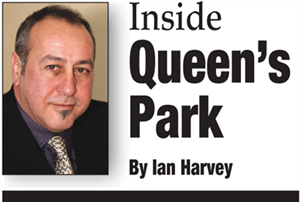There’s a new C-word banned around Queen’s Park: consultants.

Just breathing it brings winces from mandarins and politicians alike. Ontario Auditor General Jim McCarter’s report last week on the flagrant waste within the health-care system in hiring consultants has brought the cringe factor to its peak.
“We can’t use consultants,” a friend who works in government tells me over beers one night. “We can’t use the word. We can’t make it look like we’re using a consultant. The message is clear: no consultants.”
That was two months ago. I can only imagine the panic in the halls as McCarter tabled his investigation into hiring practices for consultants within the health-care system. People knew it was going to be bad news and they weren’t disappointed.
Eight of 16 hospitals checked used money earmarked for clinical and administrative services to pay consultants to lobby the government for more funding.
More disturbingly, the revelations are part of an epidemic making its way through the health-care system. As NDP leader Andrea Horwath noted: “Contracts to consultants were being handed out like Halloween candy.
One hospital hired a consultant at a cost of $163,000, and the firm got six untendered followup contracts worth another $1.1 million. Another contract grew magically from $51,000 to $675,000.
Why are patients in Windsor losing surgical beds while consultants are watching contracts grow and grow and grow without any oversight by this government?”
During my 20 years or so as a daily newspaper reporter, I filed some pretty strange expense claims for things such as clothes, underwear, toothbrushes, a cab fare from Nanticoke, Ont., to Toronto, and membership in American Airlines’ elite club so I could get close to disgraced Olympian Ben Johnson as he returned to Canada after being stripped of his medal.
Our comptroller, a dour Scotsman named Jim Yates, parsed just about every receipt I put in. He was so tight with the company’s money that he once suggested photographers stop using motor drives on their cameras to slow down the rate at which they consumed 35-millimetre film because it was expensive and threatened to dock our wages if we lost or broke our new $5,000 laptops.
I miss Jim and I miss the Jims of this world because we need them at public agencies to scrutinize and question spending. I would never have submitted a claim I couldn’t get past Jim or at least defend.
Of course, as McCarter noted, not all spending is waste.
“We acknowledge consultants can play an important role in the health-care sector,” McCarter said in his 32-page report.
“But we found far too many examples where consultants were engaged on a sole-sourced basis, where significant increases in the initial fee estimate and follow-on work were repeatedly awarded, where there was inadequate oversight to ensure consultants delivered on time and on budget, and where billings for fees and expenses were not properly monitored and supported.”
Clearly, this is a management problem. If Jim and his like-minded scrutinizers had been on the job, they would likely have scowled at the antics of a consultant being paid about $275,000 annually over a 30-month period who also hired other consultants at $97,000 and charged $50,000 in administrative support services fees not included in the contract and presumably to keep track of all of their expenses.
The consultant also billed twice for $7,000 to cover a bonus, foreign-exchange fees, and a Christmas lunch. Wait - it gets better (or worse).
The same consultant, who wasn’t named but should be, also charged taxpayers $400 per night for three nights in Chicago along with $500 in hotel phone charges; $510 per night for a second four-night stay; and $700 per night for five nights in Singapore.
Then there’s the case of a hospital administrator who apparently hired his own company to provide consulting services.
That one wasn’t even in the report since the Toronto Star broke it separately.
The upshot is red faces all around and apologies from the minister of health down to the Ontario Hospital Association.
Meanwhile, the government will table legislation to bring hospitals under the Freedom of Information and Protection of Privacy Act and will require all agencies receiving more than $10 million a year to stop using lobbyists. Hospital CEOs who don’t comply will face fines.
But as Conservative MPP Lisa MacLeod pointed out in question period, what good are rules if there’s no enforcement? “Eleven ministers and 19 agencies haven’t posted their expenses for the past year on the government’s expense disclosure web site,” she noted.
The heart of the issue here, as it was with the $1 billion in eHealth misspending last year, is that this is what passes for business as usual within many of our public agencies. What we need is a few more Jims to set them straight.
Ian Harvey has been a journalist for 32 years writing about a diverse range of issues including legal and political affairs. His e-mail address is [email protected].

 Just breathing it brings winces from mandarins and politicians alike. Ontario Auditor General Jim McCarter’s report last week on the flagrant waste within the health-care system in hiring consultants has brought the cringe factor to its peak.
Just breathing it brings winces from mandarins and politicians alike. Ontario Auditor General Jim McCarter’s report last week on the flagrant waste within the health-care system in hiring consultants has brought the cringe factor to its peak.